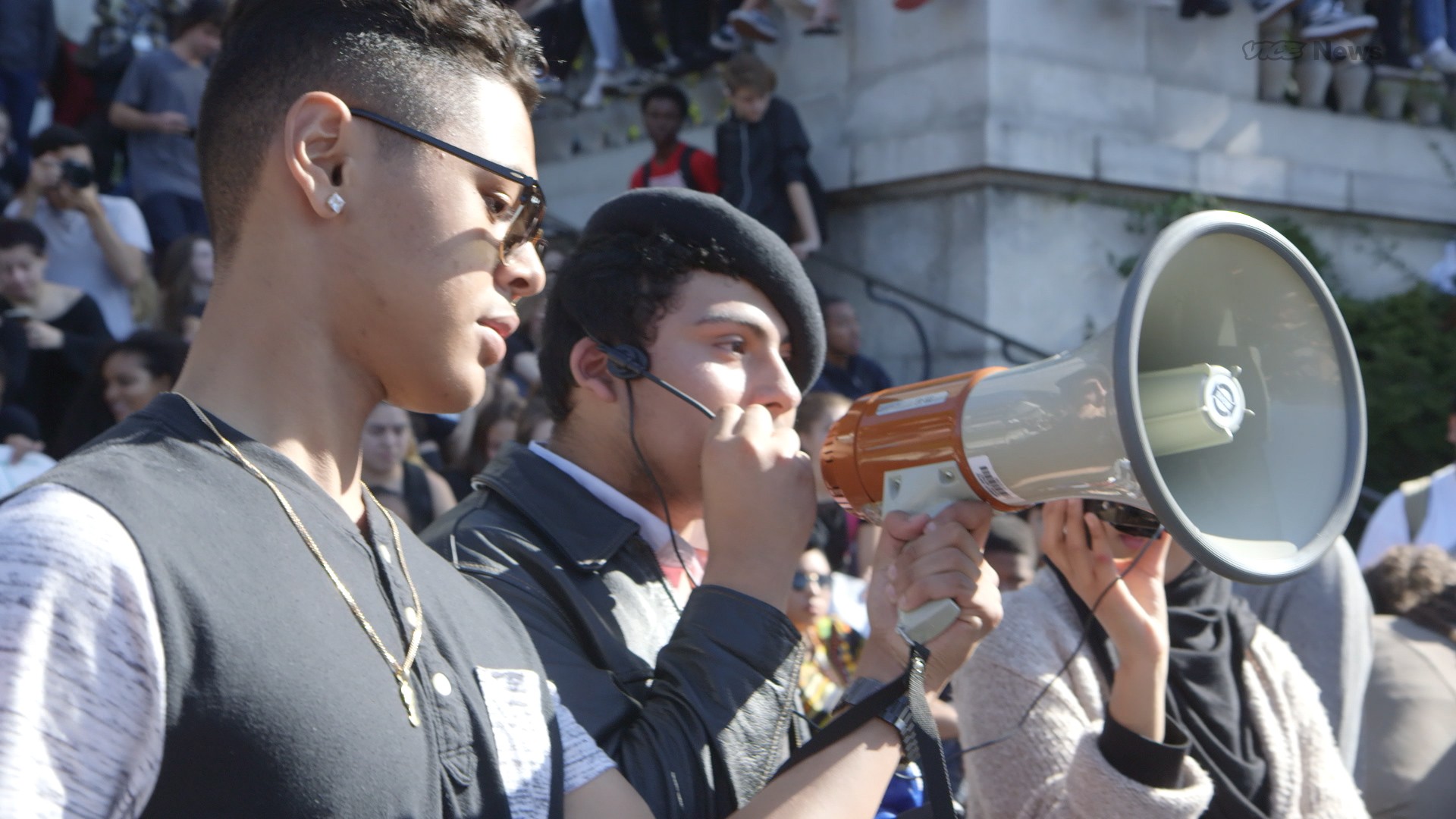A supporter steps over placards that litter the floor of the ballroom where Republican presidential elect Donald Trump spoke during election night at the New York Hilton Midtown in New York on November 9, 2016. Photo by JIM WATSON/AFP/Getty Images
The morning after the election, I felt as shell-shocked as everyone else I know that Donald Trump was about to become president. But it was my morning to drive two kids to school—my own son and a neighbor's girl. So I couldn't, as was my impulse, just lie in bed immobilized with horror, obsessively imagining dreadful things to come. I couldn't let myself be overcome with shock that my country—or what has again felt like my country for the past eight years—could elect this demagogic strongman and his eye-candy arm-piece to replace the elegant, brilliant Obamas.I had to wipe my leaky eyes, put aside the dread, and get an ungainly teenager into the car.Thank God I live in the People's Republic of Cambridge, where 44,835 people voted for Clinton and only 3,262 for Trump—roughly the same number that voted either Libertarian, Green, or write-in. The father of the girl I was picking up, a hockey and baseball dad, even came over to the car for a minute to commiserate that morning.As we drove on the usual streets, I realized the silence in the car wasn't the usual grumpy, leave-me-alone-with-my-Snapchat silence. The kids were worried—I could feel it.In part, they'd simply absorbed anxiety from the grownups around them, I figured. They don't really know what could happen—the only president these kids have ever known is Barack Obama. They can't imagine the things we fear: the shift from rule of law to rule by vindictive authoritarians; mass deportations and internment camps for suspected aliens; sea rise and extinctions as climate regulations are gutted; voting rights and employment protections eroded; harassment and violence from white supremacists.But they were shocked—they said so—by how Trump talked about women. And how he mocked a disabled reporter, in a way that would bring down the school's (or parents') wrath if they did anything like it. And how some of his supporters roughed up protestors. I felt sick at the idea that Trump will be the example they're going to have during their early teen years, breaking crudeness out of the furthest recesses of pop culture into the public discourse in ways that may get even worse.So I explained that some people actually like bullies. That siding with the bully makes them feel safer. That with a new president who is kind of a bully, things would be said from the top that we don't think are OK. Unfortunately, that would change how people talk in public, on television, and in person. Some people would say truly ugly things, crude things, hateful things—things we know are wrong.It will be important, I said, to stay firm in knowing what's right and what's wrong. It will be our job, for the next four years, to stand up against that bullying, publicly and privately. We will not say or do those things ourselves. We will tell other people it's not OK to say or do those things. And if the government does things that we know are wrong, we will protest. We will resist what is wrong.The kids' eyes were huge at this point. They were listening with their whole beings, and nodded when I asked if they understood.So I told them—and I have no idea whether they followed this part—that when I was their age, I thought school taught us about ugly things in history because people were better, because we'd figured out what was right. But I was mistaken. The reason these kids were studying the Holocaust and the civil war in social studies was to understand what has shaped our world. For instance, the Missouri Compromise—which my own eighth grader was about to take a quiz on—disallowed slavery in new states north of a certain latitude, with Missouri as an exception. It also left behind a segregated and racist legacy that eventually led to the shooting of Michael Brown in Ferguson. We study those things to understand how best in our lifetimes to struggle against ugliness, again and again, as it emerges with different faces.
Check out the VICE News Tonight segment on high school students walking out after Trump's election win.
Later, when we were alone, I asked my son if he had any other questions. He hadn't been able to sleep, he told me, because he was afraid Trump would take away our rights. Would he?Well, I said, remember that half the country voted against him. And they would protest very loudly if he tried to do something like that. (How grateful I was, that very night, that students in almost every major city began protests almost immediately, putting America on notice that the opposition won't be steamrolled.) We live in a democracy, I said, with very strong institutions that would make it hard for him to do things that were against our Constitution—the Constitution we have sitting on our mantelpiece. And we have courageous people and groups who will fight for our rights. Some of them live right on our street, in fact. They're our friends. And we'll do what we can to help.But would he put Hillary in jail?At this I had to take a deep breath. I don't know, I said. He might try. But it's not that easy. He has to get a lot of people to agree—police and prosecutors, judges and jailers. Some law enforcement people do ugly things, my son knows; we've been talking a lot about what it means for him to be strong, tall, black, and male in today's United States. But, mostly, those people in authority believe in our laws. That's true of our military, too. They want to fight for our country's freedoms; they don't want to stop us from being free. If Trump gives them orders that are against the law, they will refuse to obey.He nodded.You tell me if you're afraid of anything else, OK?More nodding. And then the headphones came back on, and I could hear hip-hop leaking out.For the first time in my life, I began to understand the angry, almost nihilistic despair in some rap music that hasn't been my favorite in the past—the sense that if it's futile to fight, then fuck y'all, I'm going to make my own power so you can't touch me. I understood why my black friends had raised their eyebrows when I said that surely this country wouldn't elect Trump. As I had that morning, I wanted to cry. But I kept driving my son to practice.Some people tell me they're relieved they don't have children—that they can't imagine what they'd say. But I am deeply grateful to be a parent right now. Having him nearby, and explaining what I believe, is profoundly calming. Left alone, my brain goes to the apocalypse, back to my childhood nightmares of Nazis invading through my windows, trying to drag me to the camps. (For what it's worth, my mom's response to my own anxiety was far more succinct than what I offered my son: "We're survivors," she texted me.)But everything I said to those two kids was true. We don't know yet exactly what's coming. We do know that we will do everything we can to resist what is ugly and illegal. And we have to keep studying the past so that we can understand the present, and do our best to protect the future.Follow E.J. Graff on Twitter.
Advertisement
Advertisement
Advertisement
Check out the VICE News Tonight segment on high school students walking out after Trump's election win.

Later, when we were alone, I asked my son if he had any other questions. He hadn't been able to sleep, he told me, because he was afraid Trump would take away our rights. Would he?Well, I said, remember that half the country voted against him. And they would protest very loudly if he tried to do something like that. (How grateful I was, that very night, that students in almost every major city began protests almost immediately, putting America on notice that the opposition won't be steamrolled.) We live in a democracy, I said, with very strong institutions that would make it hard for him to do things that were against our Constitution—the Constitution we have sitting on our mantelpiece. And we have courageous people and groups who will fight for our rights. Some of them live right on our street, in fact. They're our friends. And we'll do what we can to help.But would he put Hillary in jail?At this I had to take a deep breath. I don't know, I said. He might try. But it's not that easy. He has to get a lot of people to agree—police and prosecutors, judges and jailers. Some law enforcement people do ugly things, my son knows; we've been talking a lot about what it means for him to be strong, tall, black, and male in today's United States. But, mostly, those people in authority believe in our laws. That's true of our military, too. They want to fight for our country's freedoms; they don't want to stop us from being free. If Trump gives them orders that are against the law, they will refuse to obey.
Advertisement
